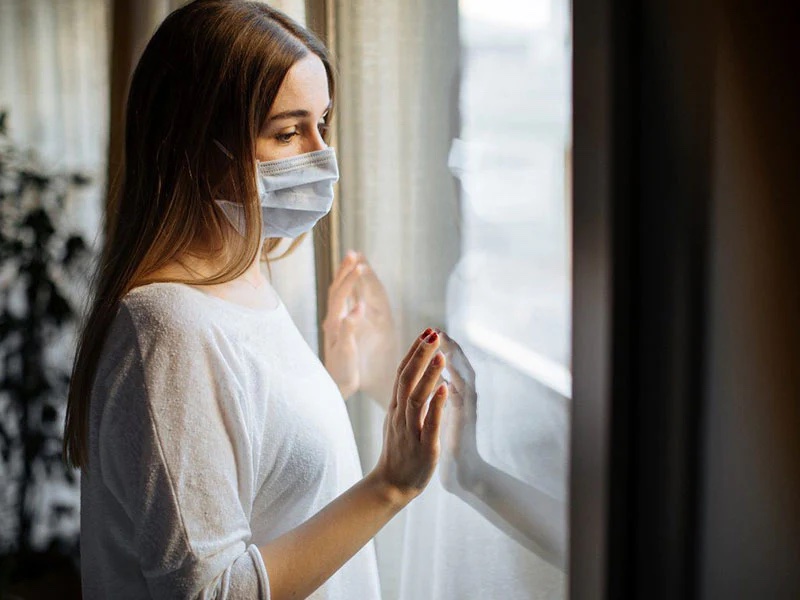- The COVID-19 pandemic has caused major disruptions everywhere, resulting in negative effects on one’s mental health. Some of the implications include anxiety, depression, and chronic loneliness.
- There are numerous ways to improve one’s mental health and well-being, from seeking online therapy programs to taking medicine prescribed by a psychiatrist.
- If you prefer a more natural route, herbs and immune-support supplements are a great alternative. These plants offer a variety of benefits such as alleviating stress, managing anxiety, and anti-inflammatory properties.
Since it started, the COVID-19 pandemic has caused major disruptions in all countries affected. Borders were closed, non-essential travel in some places were banned, and economies suffered. There is a sense of overwhelming loss: loss of jobs and sources of income, the loss of certain freedoms, and loss of loved ones. Then there’s also the air of uncertainty hanging in the air. Where do we go from here? Will we ever go back to normal?
The COVID-19 pandemic might have an effect on your mental health
It’s no surprise that the COVID-19 pandemic has had a severe impact on the mental health and well-being of individuals and communities affected. You or someone you know might be dealing with one (or even all) of the following mental health conditions:
- Anxiety – Characterized by excessive feelings of panic, fear, and uneasiness, anxiety disorders can be caused by different factors including genetics and the environment. Even before the COVID-19 pandemic hit the United States, the American Psychiatric Association estimates that about 30 percent of adults deal with anxiety and its many forms.
Unfortunately, the pandemic has exacerbated the situation, leading to higher levels of stress. People are scared of losing their jobs and loved ones, as well as contracting COVID-19 and spreading the disease. Some people are experiencing social anxiety, distancing themselves from everyone. Others suffer from constant panic attacks which can be scary as symptoms can be severe. And then there’s general anxiety which is characterized by feelings of tension, restlessness, insomnia, and sometimes even physical symptoms such as fatigue.
- Depression – The COVID-19 pandemic has also created a climate where depression isn’t uncommon, and just like anxiety, different factors come into play.
This research published in the Journal of Vocational Behavior in 2009 found that depression and other mental health risks can be caused by unemployment, something that a lot of people face today because of the pandemic. Self-isolation, high levels of stress, and anxiety can also contribute to depression. And with the temperatures gradually dropping in many parts of the United States, there’s also a higher risk for seasonal affective disorder.
Depression can be mild to severe depending on the person, but regardless of its severity, it can increase an individual’s risk for suicide.
- Chronic loneliness – When lockdown restrictions were introduced earlier this year, many people found themselves isolated not just physically, but emotionally as well. Although social media platforms and technology helped us to maintain our relationships with friends and family, it’s still easy to feel lonely when you’re not able to spend time with the people you love and care for. Meanwhile, others retreated and lessened their social interactions in general, only communicating with a select few sparingly. “When people experience stress in the outside world, they can detach themselves from that world. Once they experience this detachment, it might be difficult for them to come out into the world and socialize with others,” Yuko Nippoda, a British psychotherapist with the UK Council for Psychotherapy, shared with BBC.
People who have to undergo quarantine because of COVID-19 are also at high risk of developing chronic loneliness. Patients and persons under observation are prohibited from contacting their friends and families. And even if they are given a clean bill of health, these former patients and persons under observation might find people keeping their distance for fear of contracting COVID-19.
Chronic loneliness is hard to diagnose but can manifest itself through several symptoms that are common among mental health conditions. These include lethargy, insomnia, loss of appetite, anxiety, and substance misuse and/or abuse. Read more about chronic loneliness here.
- Post-traumatic stress disorder (PTSD) – Another mental health condition that might be caused by COVID-19 is post-traumatic stress disorder. People who contracted the disease might develop PTSD because of social isolation, not to mention fear for survival. Essential workers, most especially healthcare workers, are also at risk of getting PTSD as they are regularly exposed to COVID-19, deaths, and other stressors like supply shortages as well as fear of being asymptomatic carriers.
Unlike chronic loneliness, depression, and anxiety, however, PTSD has predictors that indicate if a person is likely to develop it. According to this article by Michigan Medicine’s Department of Psychiatry, the type and severity of the trauma an individual experiences determine if they’ll develop PTSD. Past traumas can also add to the load and push the individual over the edge.
- Obsessive-compulsive disorder (OCD) – Psychiatric experts also worry about another potential long-term effect of the COVID-19 pandemic: the increase of people with obsessive-compulsive disorder or OCD. A manifestation of general anxiety, the COVID-19 pandemic might trigger OCD among those who are naturally predisposed to it. And for those who already have the disorder, the pandemic might worsen it.
Steven Taylor, an author and professor of psychiatry at the University of British Columbia, told BBC, “For people with a genetic predisposition toward some forms of OCD (i.e. contamination obsessions and cleaning compulsions), the stress of COVID-19 is likely to trigger or worsen OCD. Some of these people will become chronic germaphobes unless they receive appropriate mental health treatment.”
Natural herbs and supplements that can help you feel better
Mental health often takes the backseat during public health emergencies. Fortunately, we live in a time where we have a great variety of options that can help with our mental health and well-being. Some people prefer to take medicine prescribed by their psychiatrists, while others opt for a more natural route.
If the latter is more to your liking, I’ve listed down several natural herbs and supplements that can help you manage your stress and anxiety during this pandemic.
- Rhodiola root – Also known by names such as arctic root, king’s crown, and golden root, rhodiola is an adaptogen, which are basically non-toxic plants said to help fight stress. Historically, people took rhodiola root to improve their high altitude tolerance and endurance. These days, however, rhodiola root is best known for alleviating stress, anxiety, and depression, as well as improving overall fitness and athletic performance.
Related products:
- Schisandra – Schisandra is another adaptogen that can help boost your mental health, well-being, and overall vitality. A popular ingredient in Chinese traditional medicine, schisandra is said to have properties that can boost your immune system and increase your resistance to stress. Traditionally, however, schisandra was used to treat a variety of liver and lung ailments.
Related products:
- California poppy – The California poppy (also known as golden poppy for its bright yellow-orange color) is not just an attractive flowering plant that also happens to be the state flower of California. It’s also a powerful ingredient in herbal medicine, said to be best for managing insomnia, stress, anxiety, and general discomfort. According to experts, Native American tribes also use the grounded seeds of the plant as either a topical treatment or a cleansing agent.
Related products:
- Jamaican dogwood – A beautiful tropical tree that grows in the Caribbean and some parts of Southern Florida, Jamaican dogwood is also extremely useful. It was used by the Native Americans to tranquilize fish hence its other name: Florida fish poison. In the 19th century, people started to use the roots of the Jamaican dogwood as a traditional remedy for a lot of conditions such as nerve pain, nervous tension, insomnia, and anxiety. It’s also said that Jamaican dogwood has analgesic properties and can be used to manage menstrual cramps.
Related products:
- Corydalis yanhusuo – Corydalis yanhusuo (YHS) root extracts have been used for centuries in traditional Chinese medicine for pain treatment, most especially chronic neuropathic pain. This latter bit was discovered by Olivier Collier, a professor and chair of pharmacology at UC Irvine. You can read more about his team’s findings here.
Related products:
- Drenamin – Drenamin is a natural health supplement that helps manage stress and maintain emotional balance. Moreover, it also has properties that boost your immune system and adrenal gland function. Drenamin is loaded with a variety of other essential vitamins such as Vitamin C and Vitamin B6, as well as niacin and riboflavin.
- AshwagandhaNative to South Asia and Central Asia and also found in some parts of Africa, ashwagandha is one of the more popular adaptogens that is incredibly well-known to relieve stress and make you relax. Some experts also believe that ashwagandha, also known as Indian ginseng, can help prevent memory loss as well as prevent or manage arthritis. With all these benefits, it’s easy to see why ashwagandha has been called the “king of Ayurvedic herbs.”
Related products:
- St. John’s wort – People have been using St. John’s wort for centuries to help with a variety of mental health conditions, most notably depression. And today, it continues to be a go-to natural alternative that’s especially popular in Europe. St. John’s wort can also be used to treat symptoms such as loss of appetite, insomnia (or to a lesser degree, trouble sleeping), and fatigue.
Related products:
- GinsengAlso known as Asian ginseng, Chinese ginseng, and Korean ginseng, this traditional medicine ingredient has a long list of health benefits. It’s best known for its anti-inflammatory and antioxidant properties. Ginseng is also a popular ingredient in health supplements and other products that aim to improve brain function and mental performance. Some studies have also shown that ginseng can help people diagnosed with Alzheimer’s disease.
Related products:
- Saffron – Saffron is one of the most expensive and highly coveted spices, but it might have more important uses than just for flavor. For instance, saffron’s stigmas and sometimes petals have been used as traditional medicine to treat mental health conditions such as anxiety and depression. There are also studies that show saffron as a potentially effective treatment for Alzheimer’s disease. If you regularly suffer from menstrual cramps, taking supplements with saffron might also help you manage the pain.
Related products:
Contact us today for more information about natural health supplements that can help you cope with your anxiety and stress. We’d be delighted to give you product recommendations based on your specific needs.
Other things you can do boost your mental health and well-being
Talk to somebody
If you find yourself dealing with any of the mental health conditions described above or feeling more down than usually, reach out to trusted friends and family.
I understand that support from friends and family isn’t always available. If talking to somebody you know isn’t possible, seek the help of a mental health expert to properly diagnose your condition. Online therapy programs such as Better Help are available if you don’t feel comfortable venturing outside of your home.
Finding a community also helps, especially if you’re a COVID-19 survivor or a frontliner. There are Facebook groups and online forums where people gather to talk about their experiences, share tips, and offer support.
Get moving
Exercise can boost your mood as physical activity can release endorphins. You don’t have to do strenuous workouts, especially if you have limited space. Stretching exercises can relieve some tension in your body.
Yoga is also great to calm your mind while working different parts of your body— there are hundreds of free yoga videos on Youtube for different levels as well as goals.
If you’re allowed to go out and about or find yourself near a park, walking might help lift your spirits. Just be sure to observe local public health guidelines and wear your mask.
Create a safe space
Panic and anxiety attacks can be scary, even if you’re in familiar territory. Having a safe space where you can safely recover can have tremendous benefits to your overall well-being. It’s also nice to have a place where you can retreat whenever you feel anxious or stressed.
Fill this space with things that make you feel safe and comfortable such as pillows and blankets. You can also put some of your most favorite things, be it a book, a picture, or even a stuffed toy, here so you can easily access it when you need an extra boost.
Take breaks from news and social media
Information overload can take a toll on your mental health. As much as possible, avoid prolonged sessions on social media and news platforms. We know it’s important to keep yourself updated with the latest news and events, so create a schedule or set a timer. For instance, stop reading news from 6:00 PM onwards. This will help you relax and wind down for a restful sleep.
Let us help you
WholeBody Solutions is a female-owned holistic wellness center. One of our goals is to help people like you make progress on your health journey. Contact us today or browse our website to learn more about us and how we can assist you.


 Opened more than 30-years ago by Dr. Ann Doggett, WholeBody Solutions is a holistic wellness center whose mission is to provide the community with safe, effective, and natural answers to health and wellness concerns. Our all-encompassing wellness center focuses on the following drug-free services: Nutrition, Chiropractic, Acupuncture, and Weight Loss. Our goal is quite simple – to make sick people well and to keep healthy people healthy. It’s that simple and that powerful.
Opened more than 30-years ago by Dr. Ann Doggett, WholeBody Solutions is a holistic wellness center whose mission is to provide the community with safe, effective, and natural answers to health and wellness concerns. Our all-encompassing wellness center focuses on the following drug-free services: Nutrition, Chiropractic, Acupuncture, and Weight Loss. Our goal is quite simple – to make sick people well and to keep healthy people healthy. It’s that simple and that powerful.

